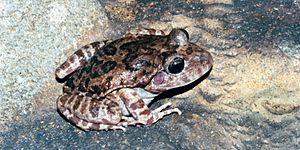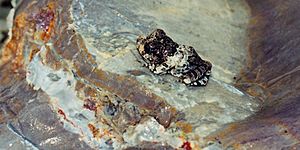Barking frog facts for kids
Quick facts for kids Barking frog |
|
|---|---|
 |
|
| Barking frog (Craugastor augusti), Municipality of Jaumave, Tamaulipas, Mexico. | |
| Conservation status | |
| Scientific classification |
|
| Kingdom: | Animalia |
| Phylum: | Chordata |
| Class: | Amphibia |
| Order: | Anura |
| Family: | Craugastoridae |
| Genus: | Craugastor |
| Species: |
C. augusti
|
| Binomial name | |
| Craugastor augusti (Dugès, 1879)
|
|
| Script error: The function "autoWithCaption" does not exist. | |
| Synonyms | |
|
Lithodytes latrans Cope, 1880 |
|
Script error: No such module "Check for conflicting parameters".
The barking frog (Craugastor augusti) is a type of frog. It lives in Mexico and the southern United States. People call it the barking frog because its sound is like a small dog barking. This sound can change a bit depending on where the frog lives.
This frog is also known as the common robber frog or cliff frog. Scientists think there might be a few different kinds of barking frogs. These include the common barking frog, western barking frog, and eastern barking frog. The name augusti honors a famous French zoologist named Auguste Duméril.
Barking frogs are common in Mexico. But they seem to be rare in the United States. They are hard to find unless they are calling out. They usually only call for a few nights after it rains.
What Does the Barking Frog Look Like?
Adult barking frogs are about 47 to 94 millimeters long. That is about 2 to 3.7 inches. They have a special fold of skin on the back of their head. Their feet also have bumps called tubercles.
Male and female barking frogs have different colors. This is called sexual dimorphism.
Where Do Barking Frogs Live?
Barking frogs live in shrublands and deserts. They are land frogs, meaning they live on the ground. They like to hide under rocks, in caves, or in cracks.
Female frogs lay their eggs in these same hidden spots. The eggs hatch directly into tiny froglets. This means they do not have a tadpole stage that swims freely in water. In the wild, these frogs can live for at least seven years. In captivity, they can live up to 11 years.
See also
 In Spanish: Craugastor augusti para niños
In Spanish: Craugastor augusti para niños
 | James Van Der Zee |
 | Alma Thomas |
 | Ellis Wilson |
 | Margaret Taylor-Burroughs |



